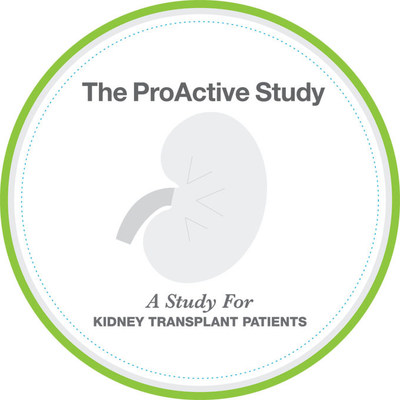New ProActive™ Study From Natera Will Test for Rejection in 3,000 Kidney Transplant Recipients
Study will evaluate improved clinical outcomes in patients using the Prospera™ dd-cfDNA test
SAN CARLOS, Calif., June 24, 2019 /PRNewswire/ — Natera, Inc. (NASDAQ: NTRA), a global leader in cell-free DNA testing, today announced a nationwide registry study for kidney transplant recipients called ProActive. This is one of the largest known prospective studies to date, incorporating donor-derived cell-free DNA (dd-cfDNA) testing into medical management of organ transplant recipients.

The ProActive study will prospectively enroll 3,000 kidney transplant patients from the time of surgery, and will measure changes in biopsy usage and clinical outcomes based on physician-directed use of the Prospera test to rule-in and rule-out active rejection. The study will follow most patients over three years, and it will follow a subset of high-risk patients for five years. The first patients are expected to enroll this year after the commercial launch of the Prospera test.
Due to the historic lack of reliable diagnostic tools for the detection of active rejection, many patients are still subjected to unnecessary biopsies, while other patients remain undiagnosed in the case of subclinical rejection, which can increase the risk of graft failure. The Prospera test has been validated to detect all types of clinical and subclinical rejection, including T cell-mediated rejection (TCMR), antibody-mediated rejection (ABMR), and mixed histologies;1 and its use is expected to help physicians detect rejection events earlier, avoid unnecessary biopsies, and safely optimize immunosuppression levels. The ProActive study is designed to measure this impact.
"Up until now, subclinical rejection has been difficult to assess with the tests currently available," said Paul Billings M.D., Ph.D., Natera’s Chief Medical Officer. "The ProActive study is intended to underscore Natera’s commitment to improving kidney transplant care, by providing physicians with critical information that reduces unnecessary invasive biopsies and better identifies when clinical and subclinical rejection are occurring. We look forward to collaborating with the transplantation community on this important study."
Natera has received favorable draft local coverage determination (LCD) from Medicare, and it is on track to commercialize the Prospera test later this year.
About the Prospera dd-cfDNA Organ Transplant Test
The Prospera test has been clinically and analytically validated for performance independent of donor type, rejection type, and clinical presentation. In repeatability and reproducibility studies, it showed superior precision with a coefficient of variation up to five times better than that of a competitive dd-cfDNA assay (1.85% vs. 9.2% within run; 1.99% vs. 4.5% across runs).2,3 In clinical validation, Natera reported higher sensitivity (89% vs. 59%) and higher area under the curve (0.87 vs. 0.74) than the competing dd-cfDNA assay.1,4 Prospera is the first assay with high sensitivity to both T-cell mediated and antibody mediated rejection.1,4 and it is the first to detect subclinical rejection,1 which occurs in 20-25 percent of patients in the first two years post transplant,5 and is considered a major driver of graft failure.
About Natera
Natera is a global leader in cell-free DNA testing. The mission of the company is to change the management of disease worldwide with a focus on reproductive health, oncology, and organ transplantation. Natera operates an ISO 13485-certified and CAP-accredited laboratory certified under the Clinical Laboratory Improvement Amendments (CLIA) in San Carlos, Calif. It offers a host of proprietary genetic testing services to inform physicians who care for pregnant women, oncologists, and cancer researchers, including biopharmaceutical companies, and genetic laboratories through its cloud-based software platform. For more information, visit natera.com. Follow Natera on LinkedIn.
Forward-Looking Statements
All statements other than statements of historical facts contained in this press release are forward-looking statements and are not a representation that Natera’s plans, estimates, or expectations will be achieved. These forward-looking statements represent Natera’s expectations as of the date of this press release, and Natera disclaims any obligation to update the forward-looking statements. These forward-looking statements are subject to known and unknown risks and uncertainties that may cause actual results to differ materially, including with respect to our efforts to develop and commercialize new product offerings, our ability to successfully increase demand for and grow revenues for our product offerings, our collaborations with commercial partners such as medical institutions, contract laboratories, laboratory partners, and other third parties, whether the results of clinical studies will support the use of our product offerings, our expectations of the reliability, accuracy and performance of our screening tests, or of the benefits of our screening tests and product offerings to patients, providers and payers. Additional risks and uncertainties are discussed in greater detail in "Risk Factors" in Natera’s recent filings on Forms 10-K and 10-Q and in other filings Natera makes with the SEC from time to time. These documents are available at www.natera.com/investors and www.sec.gov.
This test was developed by Natera, Inc. a laboratory certified under the Clinical Laboratory Improvement Amendments (CLIA). This test has not been cleared or approved by the U.S. Food and Drug Administration (FDA). Although FDA does not currently clear or approve laboratory-developed tests in the U.S., certification of the laboratory is required under CLIA to ensure the quality and validity of the tests.
Contacts
Investor Relations: Mike Brophy, CFO, Natera, Inc., 650-249-9090
Media: Anna Czene, Sr. Director, Corporate Communications, 818-731-2203, pr@natera.com
References
1. Sigdel TK, Archila FA, Constantin T, et al. Optimizing detection of kidney transplant injury by assessment of donor-derived cell-free DNA via massively multiplex PCR. J Clin Med. 2019;8(1):19.
2. Altuğ Y, Liang N, Ram R, et al. Analytical validation of a single-nucleotide polymorphism-based donor-derived cell-free DNA assay for detecting rejection in kidney transplant patients. Transplantation, 2019.
3. Grskovic M, Hiller DJ, Eubank LA, et al. Validation of a clinical-grade assay to measure donor-derived cell-free DNA in solid organ transplant recipients. J Mol Diagn. 2016;18(6):890-902.
4. Bloom RD, Bromberg JS, Poggio ED, et al. Cell-free DNA and active rejection in kidney allografts. J Am Soc Nephrol. 2017;28(7):2221-2232. doi: 10.1681/ASN.2016091034.
5. Choi BS, Shin MJ, Shin SJ, et al. Clinical significance of an early protocol biopsy in living-donor renal transplantation: Ten-year experience at a single center. Am J Transplant. 2006;5:1354-1360.


SOURCE Natera, Inc.
